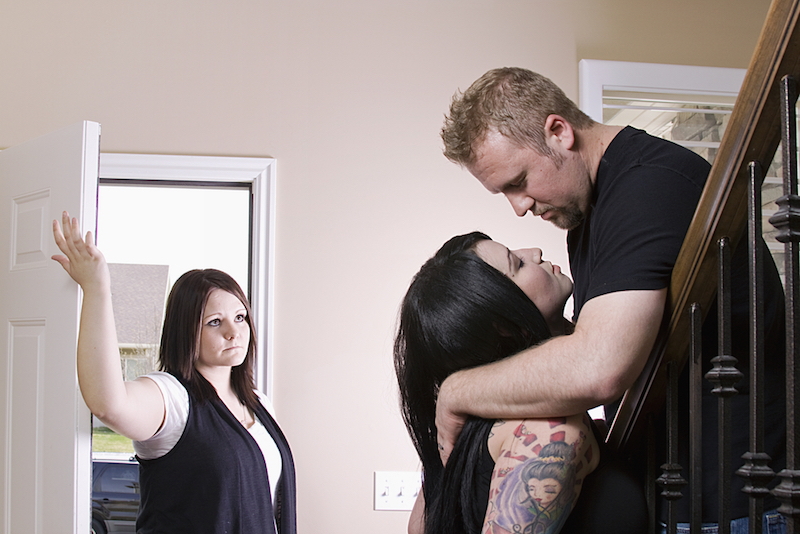Ashley Madison Scandal: Science Reveals 2 Main Reasons People Cheat

We may never know exactly what drove millions of men and women in committed relationships to log on to AshleyMadison.com to find lovers, but most cheaters fall into two categories, science shows.
At first glance, the reasons for cheating are as varied as the adulterers' lives. Upward of 30 million Ashley Madison accounts may sound like a lot (and some of those accounts may be fake "robot" accounts), but about 1 in 5 men and women in the United States cheat, according to a study published in 2011 in the Archives of Sexual Behavior. (Numbers vary depending on how cheating is defined. Other surveys have shown a big gap between men and women, with more men cheating.)
Some people are unfaithful because their spouse is ill, they yearn for more excitement between the sheets or their current partner is a poor match either emotionally or physically. Sometimes, the cheater is a narcissist or arrogant, and doesn't think he or she could be caught. Other times, the cheater is truly a nice guy (or gal). [The Sex Quiz: Myths, Taboos and Bizarre Facts]
"There's almost as many different reasons for why people cheat as there are people," said Pepper Schwartz, a professor of sociology at the University of Washington and co-author of "Snap Strategies for Couples: 40 Fast Fixes for Everyday Relationship Pitfalls" (Seal Press, 2015).
But most cheating falls into two main categories, she said.
Cheating categories
The first category applies to people who are bored and not particularly happy with their sex lives, even if the sex isn't that bad, Schwartz said.
Get the world’s most fascinating discoveries delivered straight to your inbox.
"They've been in a relationship for a long time, and they long for the excitement of something new," Schwartz told Live Science. Oftentimes, these people aren't actively looking for an affair, but they take advantage of meeting a cute crush at a conference, workplace or reunion.
Those people could hop onto Ashley Madison: In fact, research presented last year at the annual meeting of the American Sociological Association revealed that married women who log on to Ashley Madison are looking for more romantic passion, and sex, in their lives. They weren't unhappy with their husbands and didn't want a divorce, according to the lead researcher of the study, Eric Anderson, chief science officer at AshleyMadison.com.
The other category is for people in unhappy relationships.
"They don't want to leave for various reasons — children, money, you name it — but they're just sort of aching for something that's emotionally reinforcing," Schwartz said. "And a lot of people use sex for that and pursue another relationship."
These two categories are nuanced, of course — for instance, for those in unsatisfying marriages, some stray to get revenge on a partner, and some just want to find more satisfying sex, although research indicates revenge doesn't typically motivate an affair, she said. [6 Scientific Tips for a Successful Marriage]
"It could be a ho-hum sex life, but you don't have to have a bad sex life to cheat, and you don't have to be out of love with your partner to cheat," Schwartz said.
Some couples draw up detailed agreements stating that they can seek sex elsewhere, even outlining what they can do and with whom they can do it. Other couples have a "don't ask, don't tell" understanding in which they don't want to know whether their partner cheated.
"It's a rare group, but it's not impossible for couples to have an understanding that it's not going to be entirely monogamous forever," Schwartz said.
Breadwinners and cheaters
Money can also play a role in cheating. The more economically dependent people are on their partners, the more likely they are to cheat, especially if they are men, said Christin Munsch, an assistant professor of sociology at the University of Connecticut.
This measure isn't in terms of absolute income, but how much one partner earns relative to the other. [The 10 Most Surprising Sex Statistics]
"It suggests that we don't like coming up on the losing end of this comparison, and we're going to seek alternative partners," to possibly make up for it, Munsch told Live Science.
Surveys show that although both men and women in heterosexual marriages cheat on their breadwinning spouses, men were a lot more likely to be unfaithful when their wives had higher incomes than vice versa. Perhaps because society emphasizes masculine norms — for instance, that men should be macho moneymakers — some men feel inadequate if they're making less dough than their female partner, Munsch said. (Speaking of inadequate, performance anxiety can up the chances of infidelity, according to research published in 2011 in the journal Archives of Sexual Behavior. That study revealed that men and women who feared sexual failure were 6 percent and 8 percent more likely, respectively, to cheat than others. A propensity toward sexual excitement also increased the likelihood of cheating.)
"We know that, under conditions of masculinity threat, men are more likely to engage in hypermasculine behaviors," such as cheating or sex, she said. "[These behaviors] also allow you to punish the person who is threatening you, your breadwinning spouse."
Male breadwinners are also more likely to cheat than female breadwinners, possibly because they have more opportunity to do so. For instance, women breadwinners may have less time to go philandering because they do more housework and child care than men do in the United States, Munsch said.
Cheating is made easier by opportunity. Men who work in professions that are dominated by women are more likely to cheat, according to new research by Munsch that has yet to be published.
"Men in female-dominated occupations are around a bunch of women all the time," she said, so it might be easier to start a tryst, as well as re-establish their masculinity if it feels threatened. Of course, with an online site whose motto is "Life is short. Have an affair," the proximity of the opposite sex on a daily basis may not matter.
Should you tell?
Should people who have profiles on Ashley Madison tell their partner?
"In general, I would say don't tell," Schwartz said. "You've already made a mistake on something that could threaten your relationship."
However, if the profile holder thinks his or her spouse might find out, it's best to tell them ahead of time, she said.
But, of course, every couple is different. Some want to know about infidelities, and others would rather not know the details, she said.
"If you put this out there, be prepared for some major reaction, in most cases," Schwartz said. "If it's a strong relationship, I think they'll get over it — it will help people know each other better. If it's a relationship that's fragile, it could really cause a tailspin, and I would get the name of a good therapist and see if your partner is willing to talk about it."
Follow Laura Geggel on Twitter @LauraGeggel. Follow Live Science @livescience, Facebook & Google+. Original article on Live Science.

Laura is the managing editor at Live Science. She also runs the archaeology section and the Life's Little Mysteries series. Her work has appeared in The New York Times, Scholastic, Popular Science and Spectrum, a site on autism research. She has won multiple awards from the Society of Professional Journalists and the Washington Newspaper Publishers Association for her reporting at a weekly newspaper near Seattle. Laura holds a bachelor's degree in English literature and psychology from Washington University in St. Louis and a master's degree in science writing from NYU.
 Live Science Plus
Live Science Plus






